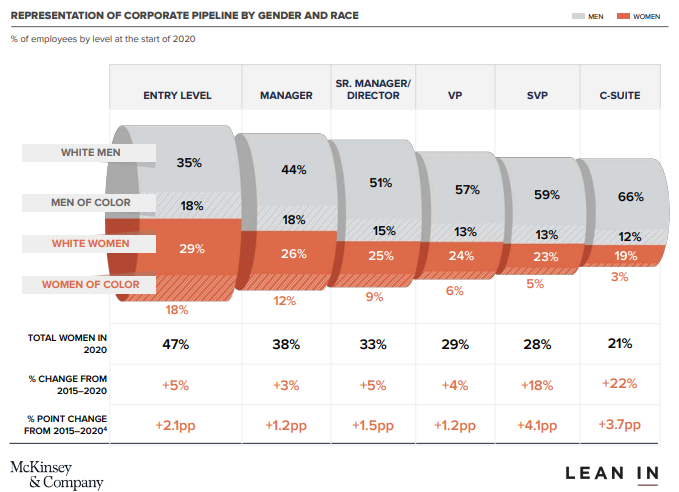How to combat Imposter Syndrome as a Woman of Color

As referenced in my last article, around 75% of female executives across industries reported that they’d experienced imposter syndrome in their careers. This staggering number focuses our attention on the influence of imposter syndrome on women which begs the following questions: How are women of color significantly impacted? How have we come to this? How has the ongoing pandemic affected feelings of this syndrome? Why is it so important we fight against imposter syndrome?
Racial and gender discrimination, both de jure and de facto, have plagued women of color in more ways than one. A visible effect of this is a lack of representation in the workforce. The UN Sustainable Goals Review for 2021 found: “Though women accounted for nearly 39% of the global labor force in 2019, they occupied only 28.2% of managerial positions.” While this figure is not race-specific, the number is even lower for female board members of color, a nonprofit organization Catalyst found that only 5% of board directors in Fortune 500 companies are women of color.
Such a lack of representation can have a detrimental impact on women. Clinical psychologist Emily Hu states, “We’re more likely to experience imposter syndrome if we don’t see many examples of people who look like us or share our background who are clearly succeeding in our field.” Lack of representation can create the notion that success is harder to achieve for women of color, especially when many falsely claim that success, for women, is due to luck. Being surrounded by people who don’t look like you can make you doubt yourself even if you’re fully qualified or even overqualified for your job. Additionally, with the types of discrimination, like microaggressions towards protective hairstyles or not being invited to the ‘Boys Club’, mentioned in the former paragraph, such a workplace with little diversity can be uber-competitive, creating a lack of trust and friendship between employees, leading to further negative thoughts and feelings.
Feminist movements have made steps over the years to help increase the number of female leaders, from online campaigns to legal protests. However, COVID has added to this lack of representation and caused some major steps back. McKinsey & Company, a social justice research facility, found that “women’s jobs are 1.8 times more vulnerable to this crisis than men’s jobs. Women makeup 39 percent of global employment but account for 54 percent of overall job losses.” With fewer women in the workplace, there is less representation, leading to stronger feelings of imposter syndrome within women. Watching other women leave your workplace can cause you to question if you’re qualified for your job or if you’ll lose it. The latter is probable if a company is cutting workers in droves; however, it can have harmful effects coupled with imposter syndrome.

To play devil’s advocate: Why is it so important women stay in the workplace? Women should have an equal chance to support themselves financially and, if any, their dependents, but there are also additional factors as to why workplaces need to diversify and inadvertently combat imposter syndrome. DeVry University finds that diversity in management, with both women and people of color, directly leads to more financial growth and new ideas in multiple studies. They found in one survey that “those with more diverse management teams earn 19 percent more revenue from innovation than their less diverse competitors”. DeVry also found that having a diverse board led to the sharing of more ideas between employees. A company needs diversity to represent its prospective consumers and their needs, generate new ideas, and promote growth. This kind of advancement, however, is endangered, as McKinsey & Company and Lean In declared in a 2020 study that “For every 100 men promoted to manager, only 85 women were promoted—and this gap was even larger for some women: Only 58 Black women and 71 Latinas were promoted.” Progress can’t be made when women aren’t in the workplace, and when women aren’t in the workplace, imposter syndrome can continue to plague female workers.
In my experience, feelings of imposter syndrome can come from the most unlikely places. Working at my first job in a fast-food restaurant made me feel like I had duped the managers into hiring me, as I had no food experience. Even after getting a food handler’s certificate, I felt underqualified, especially in the kitchen surrounded by largely male workers. As a woman of color, I found it intimidating to be working in a place primarily populated by white men who had a lot more experience in the job. I found a couple of strategies to help battle this combination of first-day jitters, underlying microaggressions, and imposter feelings. Additionally, this summer, I started my first internship (here at B.E.). Even with the welcoming environment, I still felt underqualified and a little fraudulent as a high school student surrounded by older students, even after being promoted to a team lead. Through my experiences, I have gathered tips that helped me combat negative emotions in both scenarios.
My tips:
- Befriend experienced workers. Having someone take you under their wing, or simply talk to, can help you learn tips on the job and feel more experienced
- Make connections with other people from your background in the workplace. These connections can help you feel that you’re not alone and not an anomaly within your workplace, especially if it’s not diverse
- Talk about your feelings. Whether it be with your friends or a therapist, naming your fears gives you power over feelings of imposter syndrome, which can help you beat it in the long run
- Read books about successful women of color. Reminding yourself that there have been accomplished women before you can help fight these feelings of fraud
- If you feel that you can’t manage your thoughts alone, reach out to a medical professional or contact a mental health line
National Alliance on Mental Illness (NAMI) Helpline: 1-800-950-NAMI (6264)
